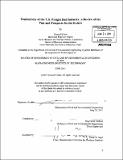Productivity of the U.S. freight rail industry: a review of the past and prospects for the future
Author(s)
Kriem, Youssef
DownloadFull printable version (19.34Mb)
Other Contributors
Massachusetts Institute of Technology. Dept. of Civil and Environmental Engineering.
Advisor
Nigel H.M. Wilson.
Terms of use
Metadata
Show full item recordAbstract
Productivity growth in the U.S. freight rail industry has slowed in recent years, raising the issue of the sustainability of the significant improvements achieved during the past three decades. Indeed, between 1979 and 2009, all the inputs of the industry saw their productivity increased by rates ranging from 110% in the case of fuel to 430% in the case of labor. Operations productivity measured by the ratio of operating revenues to operating expenses increased by 76% over the same period. The purpose of this study is to summarize and explore the mutations that occurred in the freight rail industry at the institutional, operational, managerial, and technical levels in the past 30 years. Several productivity metrics were selected, organized into a comprehensive framework, and used to document the changes recorded in the different dimensions of productivity. Three different methods, based on the mathematical analysis of historical data, were developed to estimate the contribution of a series of pre-identified factors to the overall gain in productivity over this period. Both these methods and the productivity framework could be applied to the future assessment of the productivity of any other transportation mode. The principal outcome of this study is that among all the impacting factors, the improved labor productivity and the declining shipping rates are the ones that contributed respectively to the largest gains and the largest losses in operations productivity over the 30-year period. Finally, the study concludes that future improvements in operations productivity are likely to be conditioned by the evolution of shipping rates for the most strategic commodities, and that the contributions of fuel, infrastructure, and equipment productivity will gain in importance as a result of the limited incremental improvements still possible in labor productivity.
Description
Thesis (M. Eng.)--Massachusetts Institute of Technology, Dept. of Civil and Environmental Engineering, 2011. Cataloged from PDF version of thesis. Includes bibliographical references (p. 86-87).
Date issued
2011Department
Massachusetts Institute of Technology. Department of Civil and Environmental EngineeringPublisher
Massachusetts Institute of Technology
Keywords
Civil and Environmental Engineering.